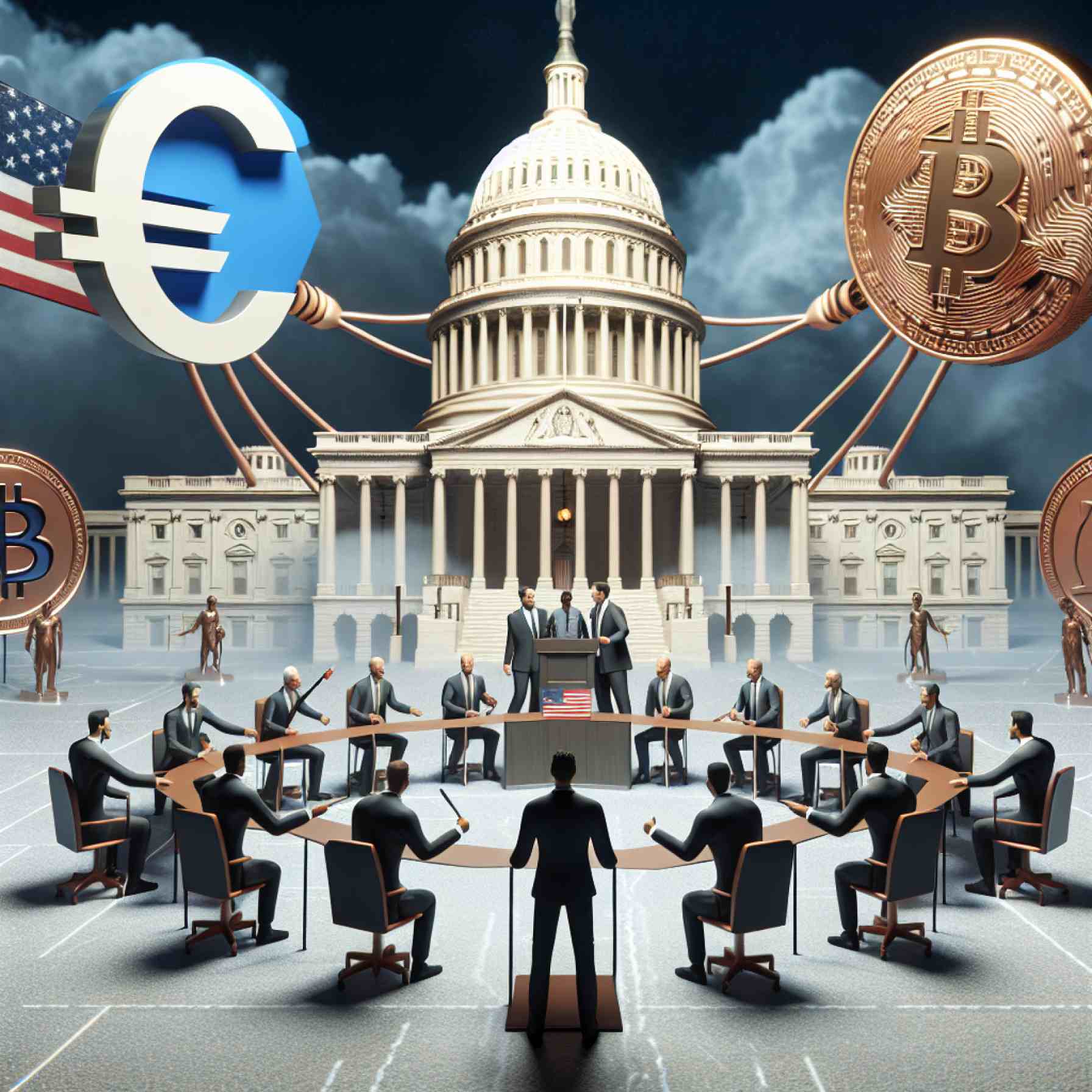- A joint committee session on Capitol Hill aimed at clarifying cryptocurrency regulation was disrupted, showcasing the tension between politics and finance.
- Maxine Waters, a prominent Democrat, halted proceedings over new revelations connecting a Trump-affiliated stablecoin to significant financial dealings.
- A proposed bipartisan bill intended to streamline regulatory oversight of digital assets by differentiating the roles of the SEC and CFTC faced setbacks.
- Reports exposed a link between an Abu Dhabi firm and Trump-related crypto activities, raising concerns about financial manipulation and ethics.
- Revelations affected bipartisan support, stalling progress on stablecoin regulation and emphasizing money laundering and security vulnerabilities.
- The turmoil highlights the urgent need for transparent and ethical governance in the digital asset space.
A tempest brewed on Capitol Hill, unraveling the fragile accord over digital asset regulation, a space where clarity has long been elusive. Chaos ignited during a meticulously planned joint committee session intended to map the future of cryptocurrency regulation, spotlighting the neuralgic intersection where politics and finance collide.
The storm broke when Maxine Waters, California’s fiery Democrat and the ranking voice of the House Financial Services Committee, derailed the meeting with a staunch refusal to grant unanimous consent—a procedural linchpin needed to keep the proceedings on track. Her dissent burst forth during the preliminaries of Bryan Steil’s remarks, the Wisconsin Republican who chairs the Digital Assets Subcommittee. Waters and her Democratic allies voiced objections rooted in recent revelations tying former President Trump’s family to potent crypto dealings they felt demanded scrutiny. This impasse transformed the formal hearing into a mere roundtable, participants shed their prospective roles as sworn witnesses, signaling the upheaval beneath the committee’s veneer.
At the heart of the controversy lies a proposed bill, a venture crafted with notable bipartisanship, promising to disentangle the U.S.’s regulatory web by demarcating turf between the Securities and Exchange Commission and the Commodities Futures Trading Commission. Esteemed committee members had united to prescribe registration processes for digital assets—a framework that could infuse much-needed oversight into the burgeoning crypto industry.
However, the discovery of a multibillion-dollar manipulation behind the curtains disrupted this regulatory journey. Reports unearthed a staggering connection: an Abu Dhabi investment firm, MGX, was leveraging a Trump-affiliated stablecoin from World Liberty Financial—a Trump family creation—in dealings potentially ballooning their coffers by hundreds of millions. This firm handshake between power and crypto has set blaring alarms on Capitol Hill.
The scrutiny cast a long shadow over Trump’s burgeoning ventures in the crypto domain, including his audacious issuance of the TRUMP memecoin and the controversial $WLFI coin, netting $550 million soon after its launch. A lavish dinner planned at a Trump resort, an ode to top TRUMP memecoin stakeholders, only thickened his narrative’s plot. These revelations dimmed the bipartisan glow, injecting doubt and igniting friction.
As whispers transformed into roars, the repercussions rippled across the Senate. The hopes of pushing through stablecoin rules—aided by an initially promising bipartisan bill—now falter against accusations and financial entanglements that demand deeper inspection. The controversy incited a withdrawal of support by critical Democratic voices, emphasizing vulnerabilities in money laundering and international security.
The saga that unfolded not only skewered the day’s legislative agenda but also magnified the pressing need for transparent and ethical oversight in digital realms. Senate Majority Leader John Thune’s stance encapsulates the day’s uncertainty: open to amending proposals to court Democratic favor, his disposition underscores the precarious balance between policy progression and political discord.
In the fast-evolving crypto landscape, the upheaval serves as a stark reminder: the future of digital currency regulation rides on consensus, transparency, and integrity. The Capitol awaits its resolution, perched anxiously in the wings of an era-defining leap into financial innovation.
Explosive Revelations in Capitol Hill’s Crypto Regulation Showdown
Overview of the Regulatory Chaos
The turmoil on Capitol Hill over cryptocurrency regulations highlights the complexity and urgency of establishing a clear framework for digital assets. As the debate intensifies, it becomes evident that the intersection of politics and finance is fraught with challenges that need informed, decisive action.
Unpacking the Controversy: What Led to the Regulatory Clash?
The session intended to map out cryptocurrency regulation was disrupted by political disagreements. Maxine Waters, a prominent Democrat, voiced strong objections over perceived conflicts of interest involving the Trump family and their cryptocurrency dealings. This derailed the proceedings and spotlighted contentious issues surrounding transparency and accountability in digital finance.
Key Points of the Proposed Bill
– Jurisdiction Clarity: The bill seeks to delineate responsibilities between the Securities and Exchange Commission (SEC) and the Commodities Futures Trading Commission (CFTC), aiming to prevent regulatory overlap.
– Registration Framework: Introducing a robust registration process is crucial for legitimizing digital assets, thereby enhancing investor confidence and market stability.
Broader Implications of the Abu Dhabi Crypto Connection
Discoveries of a potential multibillion-dollar manipulation involving MGX, an Abu Dhabi investment firm, and Trump-affiliated stablecoins have raised concerns about international finance’s impact on U.S. regulations. This cross-border involvement underscores the need for global cooperation in crypto oversight.
Real-World Use Cases and Market Trends
1. Enhanced Compliance: Businesses need to prepare for possible regulatory changes by adopting stronger compliance measures.
2. Investor Caution: Market participants should remain vigilant, opting for projects with transparent governance and regulatory alignment.
Pros and Cons Overview
– Pros: A clear regulatory framework could facilitate innovation, protect consumers, and attract institutional investors to the crypto market.
– Cons: Political divisions and international entanglements may stall progress, causing uncertainty and reducing market confidence.
Reviews & Comparisons: Cryptocurrency Regulation Models
Countries like Switzerland and Singapore have successfully implemented crypto-friendly regulations, balancing innovation with oversight. The U.S. can draw inspiration from these models to refine its approach.
Security & Sustainability Concerns
The use of digital currencies linked with influential figures or corporations amplifies risks related to privacy, security, and environmental sustainability. Comprehensive regulations can mitigate these risks by ensuring digital assets adhere to ethical and environmental standards.
Actionable Recommendations
– For Investors: Stay informed about regulatory developments and diversify investments to mitigate potential risks.
– For Policymakers: Engage stakeholders across political and financial sectors to refine and adopt a fair regulatory framework.
Conclusion and Quick Tips
As the U.S. grapples with its digital currency regulations, it’s crucial to establish an inclusive, transparent process that aligns with global standards. Stakeholders from all sectors should contribute to fostering a regulatory environment that supports innovation while safeguarding public interest.
For more insights on the evolving landscape of digital finance, visit the CoinDesk for up-to-date analysis and news.







